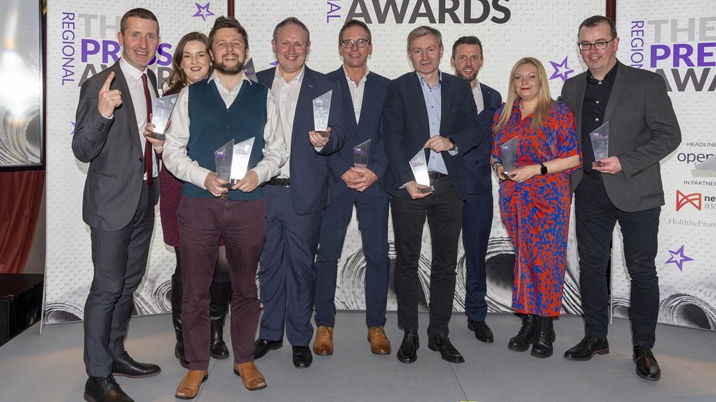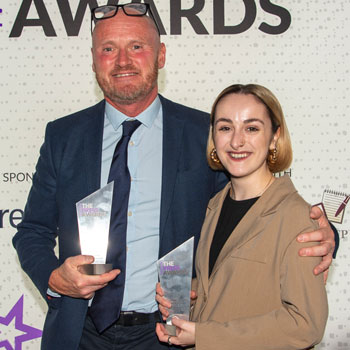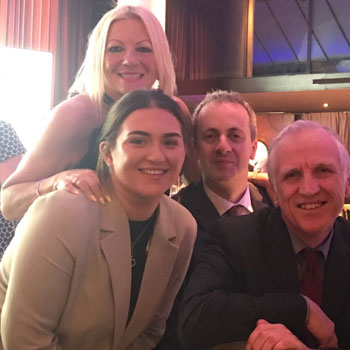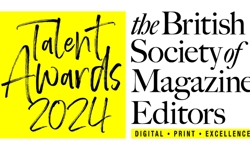
And so to Quaglino’s, a chichi restaurant in the heart of London’s Mayfair (where else, dahhling?) for, rather perversely, the Regional Press Awards.
Whether it was the ghosts of Giovanni Quaglino, who founded the Mayfair restaurant in 1929, or regulars Evelyn Waugh, Princess Margaret, Judy Garland or Princess Diana, ‘the Quag’ provided a sumptuous backdrop for the awards, even if attendees did have to slog in from all parts of the United Kingdom.
From big cheeses to Babybels, everyone has their eye firmly on the prize: ensuring a sustainable and viable regional press where journalism can flourish.
Do we agree with the observers who think the sickly patient is heading for intensive care, beset by troubling revenues, falling audience and a collective ‘what’s the point’ shrug with news and information coming in from big tech, AI bots and your street’s WhatsApp group?
Vox pop
Armed with an easy to fill in form, a notebook and pencil (remember them?), I set off around the room nabbing people to answer this question:
What one big thing does regional journalism need to do now to secure its future?
This totally unscientific survey yielded as diverse answers as there were varied people in the room, from the heartfelt plea: “Don’t post any old crap. Fill the paper / website with original content. All reporters to spend time in the community and time on stories. Don’t clog websites with shitty ads,” said Amanda Ferguson, Belfast-based freelance extraordinaire and one of the judges.
To the pithy: “Money”, no, wait, that’s crossed out and replaced with “revenue” by Maria Breslin, editor, Liverpool Post.
But it was the ‘S’ word – subscribers / subscriptions – that exercised most respondents before, during and after the mini-quiche and saucy chicken (bizarrely, no pudding, but wine and coffee to pass the time).

Abi Whistance, winner of Young Journalist of the Year for her work at Mill Media, led the way: “Subscription based funding. Advertising revenue is not sustainable. We need to start over and build a readership that has faith in the content we’re producing and is willing to pay for it. It happened before – it can happen again.”
“Offer premium content for a local audience that will pay for it,” said Martin Breen, deputy editor-in-chief at the all-conquering Belfast Telegraph and Sunday Life. “People pay for information and what interests them.”
Ian Carter, editorial director of Iliffe said simply: “Subscriptions”, while Phil Hayes, head of news, KentOnline, echoed his boss with: “Get more subscribers.”
And journalist Cathy Duncan, now MA journalism course director at Cardiff University said: “Convince readers that they should pay for their news. Bring back the curated brands that tell you things you didn’t know you didn’t know.”
Over at the marketing desk, David Higgerson, chief digital publisher at Reach was keen for the industry to sell itself more effectively to both readers and those who can help secure its future. “Despite the criticisms we see daily, from readers and within the industry, the only place you’ll find reliable, constant timely news about what’s going on is from local news brands. That’s worth shouting about.”
This was a view supported by Marcela Kunova, editor of journalism.co.uk and one of the judges, who said: “Better marketing. All those amazing stories will have no impact if no one – and especially younger audiences – don’t know about them. Also, to be more physically present in the communities as that’s the one thing the platforms can’t do.”
There were some ideas about how to reposition regional journalism so it can continue to have an impact. Rather trenchantly, Steve Barron, managing director of Highland News & Media declared: “Accept that print won’t exist and control / accelerate the process.”
And his newsroom representative, Andy Dixon, content editor for the Inverness Courier, Ross-shire Journal, Strathspey and Badenoch Herald, Highland News and North Star was also on message: “Focus all its efforts on digital and understanding what works for the audience.”
Charles Thomson from Newsquest, weekly Reporter of the Year and Crime and Investigative Reporter of the Year, is a man we should listen to: “Differentiate itself from the partisan national press in order to maintain and build the trust of readers.”
And Professor Kurt Barling, journalism academic, former BBC reporter and judge, was one of just a handful to address technological advances: “Embrace AI technology but in collaboration, not competition, with other regional newsmakers.”
But last word should rightly go to Sam McBride of the Belfast Telegraph who was crowned daily Reporter of the Year, Feature Writer of the Year and Opinion Writer of the Year: “Focus on quality journalism however it is told (print, web, podcasts etc) – that’s the only hope of survival.”
Celebrating excellence
Peter Sands, co-chairman of the judges, director of Sands Media Services and former editor of The Northern Echo was understandably upbeat, maintaining the awards send out a message, both internally and externally, of an industry confident in itself.
“Fourteen years ago, during hard times, they were cancelled allowing commentators to refer to “a sad reflection of the parlous state of the sector”. I said at the time that, if the regional Press doesn’t celebrate the excellence that runs through its newspapers, applaud the journalists who go that extra yard every day, recognise the editors who invest in off-diary work and innovation then who will?” he said.
“So, it is enormously satisfying to see the awards thriving (well done Haymarket) showing that despite the many challenges, the regional media is alive, kicking, innovative and still making a big difference. The message I got back loud and clear from the judges was that the quality of the entries was outstanding.
Typically, though, the event was not without its grumbles.
The London venue exercised Gavin Foster, regional editor for Newsquest based at the Northern Echo who said: “Move awards to the regions.”
Gill Sutherland, deputy editor of the Stratford Herald, picked up on another angle and posted: “@RegPressAwards a major disappointment … white men picked up 9/11 awards mainly city/crime reporting – many previous & multi winners, leaving women 2 wins/18%. Disgraceful.”
Iliffe Editorial Director Ian Carter responded with: “Does an event charging £325 (!) a seat on top of the £50 entry fee really help diversify the industry by encouraging new or different entrants to showcase their work? I suggest not.”
There was sympathy from co-chair Peter Sands: “I understand the concern that the majority of individual categories were won by men both this year and last. We work hard at ensuring there is an equal number of female and male judges but we clearly need to do more.”
Best of the Best
The Belfast Telegraph and Sunday Life rightly took the plaudits with no fewer than eight awards – including three individual prizes for journalist Sam McBride. But there were plenty of other winners to admire away from the headlines.
Reporting Communities Award: Greater Govanhill

The legacy publishers may still dominate, but there was general acclaim for Greater Govanhill, a magazine and news website that was launched in 2020 as a community interest company aiming to enable the community to tell its own stories through journalism.
With a vibrant news website, online noticeboard, radio show and ‘Community Newsroom’ which helps local people in this south-east Glasgow community develop journalism skills through free workshops and training programmes, Greater Govanhill has become a powerful example of how local, community-led journalism can bring about real change.
“It had a mission and spoke for the community it served, was vibrant and produced great stories,” the judges said. “The community of Govanhill is well served by the publication.”
Posting on X, @govanhill_mag said: “We’re absolutely delighted to receive this prestigious Regional Press Award for Reporting Communities here in Govanhill! Collected by our very talented journalism team of Samar Jamal and Devon McCole. This award really belongs to all of our brilliant community members who contribute to each and every issue making it all possible.”
Cathryn Nicholl Award: Bridget Dempsey, Newsquest

Newsquest Cumbria’s nuclear correspondent (now, that is one job I’ve never had!) and Times and Star chief reporter, Bridget Dempsey, collected the Cathryn Nicholl Award which ‘focuses on brilliant interviewing and feature writing’ of a journalist working for a weekly or daily local or regional newspaper published in the UK, who is aged between 18 and 25.
Thanks to persistent networking over the course of many months, Dempsey was able to secure a relatively rare interview with Sellafield’s CEO, Martin Chown, which offered not just an insight into future plans for the site but a personal look at a leader of local importance who guided Sellafield through the pandemic and its aftermath.
Dempsey and her team who had trekked down from Cumbria had “a really amazing day at the awards”. She wrote: “So honoured to be in a room with so many amazing journalists and even better to win, absolutely delighted.”
Digital Initiative of the Year: Public Notice Portal (PNP)
A collective eyebrow was raised around the room as Public Notice Portal was named as Digital Initiative of the Year. Up against established brands like Manchester Evening News, Northern Echo and Surrey Advertiser, the largely unheralded public notices website captured the attention of the judges, who praised the initiative for engaging people with public notices and enabling them to get involved.
Backed by regional publishers and the News Media Association, the portal is designed to enhance local papers’ coverage of public notices in print by also making them available online via news media websites and the central portal itself.
In its response to the Culture, Media and Sport Committee’s report on the sustainability of local journalism, the government said the portal was a “welcome innovation, intended to take advantage of print publishers’ growing digital audiences and to provide a centralised resource for all categories of notice”.
Have a look for yourself at www.publicnoticeportal.uk – it’s strangely addictive…
This article was first published in InPublishing magazine. If you would like to be added to the free mailing list to receive the magazine, please register here.












